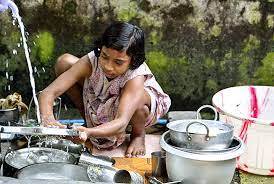
On December 28 2016, child domestic labour case ‘Tayyaba Torture Case’ received media attention when the pictures of 10 years old wounded housemaid went viral on social and electronic media, who was brutally tortured and abandoned in Islamabad by a convict Maheen Zafar and her husband co-convict Raja Khurram Ali khan former additional district and sessions Judge.
The former Honourable Chief Justice of Pakistan Mian Saqib Nisar took his first suo moto action in this case after a hype was emerged on social and electronic media and subsequently on the directions of former Chief Justice of Pakistan, the trial of this case was conducted in Islamabad High Court by a single member bench. I was appointed rapporteur in this case by the HRCP. I had the privilege to not just support the child victim ‘Tayyaba Bibi’ but also to attend and note down all the proceedings of this case from beginning of the trial up till final appeal in Honourable Supreme Court of Pakistan.
The couple was convicted in above case by the trial court and awarded sentence of one-year simple imprisonment with fine of rupees fifty thousand to each under section 328-A of Pakistan Penal Code. In appellate stage, the sentence of convicts was enhanced to simple imprisonment of three years along with payment of fine of rupees fifty thousand to each. They were also convicted under section 201 of the PPC and sentenced to simple imprisonment of six months to each.
Moreover, the co-convict Maheen Zafar was also convicted under section 337A(i) and 337F(i) of PPC and was declared liable to payment of Daman of rupees five lac to victim. The Hon’ble Supreme Court also maintained their conviction under the above-mentioned offences at appellate stage.
After the lapse of six years after the Tayyaba Torture case, a same type of case ‘Rizwana Torture Case’ has received media attention in last quarter of July 2023, in which a 13-14 years old housemaid Rizwana Bibi was brutally tortured by a wife of a Civil Judge Somia Asim at Islamabad.
The victim received several injuries on her body including the fractured teeth/arms/ribs. The case received global attention because of its coverage on print and electronic media.
Initially, a very weak FIR was lodged against the accused persons without inserting the relevant sections of PPC that deal with cruelty and torture on child. But as the case received media and civil society attention, and subsequent notice by the Prime Minister of Pakistan and other high-profile government officials, relevant sections of PPC dealt with cruelty, hurt and torture on child were inserted in the FIR.
Although, Rizwana Torture Case is more heinous than Tayyaba Torture Case, but suo-moto notice by Honourable Chief Justice of Pakistan has not been taken in this case as it was taken in Tayyaba Torture Case by the that time Chief Justice of Pakistan.
Child domestic labour is widely prevalent in Pakistan and thousands of children are involved in this practice. The issue receives public, legislators and government officials’ attention when a case like Tayyaba or Rizwana occurs and receives media hype and thereafter reinstate to previous position.
Notwithstanding, that Federal and Provincial govts. have enacted legislation to address the child domestic labour, but such cases are emerged every other day in ICT as well as across the country. ICT has the highest literacy rate in Pakistan, at 94% and elite class of people live in Islamabad, who are well educated and aware of national laws, policies and human rights of the citizens.
The question is that when literacy rate is highest in ICT, people are well educated, employed at executive positions and receiving awesome earnings, then why do such cases emerge in ICT, in which high rank govt. officials are involved in committing abuses with the children. The answer to this question is that major factors contribute in committing child domestic labour in ICT and across the county are as under;
Firstly, majority of the people in the country are not law-abiding and human/child rights fulfiller. So, if one has no sentient to abide by the laws of the country and to fulfill the human/children rights, then protection of children from domestic labour cannot be ensured.
Secondly, poverty is directly linked with child domestic labour. Due to increasing inflation in the country, approximately 24% of Pakistani population lives below the national poverty line. Pakistan ranks 92 out of 116 countries on the list of the International Poverty Index.
Poor families exploit their children in cheap domestic labour so that they could contribute in their household incomes. The demand for cheap labour in domestic work also contributes in exploitation of children.
Thirdly, inadequate educational infrastructure/schools, and limited resources contribute to number of out of school children, make them vulnerable to child domestic labour.
Lastly, enforcement of labour laws is very weak in Pakistan. Thousands of cases of trafficking in the form of forced labour are reported from each province every year, but conviction rate in such cases is negligible, because of involvement of politicians, feudal lords of the areas and weak prosecution cases. So, perpetrators escape from punishments and deterrence is not created in society.
Mere inserting of stringiest provisions of PPC in the FIRs in child domestic labour cases are not enough, unless the mindset of people of Pakistan is not changed and they realise that child domestic labour is violation of human rights and an offence, child domestic labour can not be eradicated from our society.

